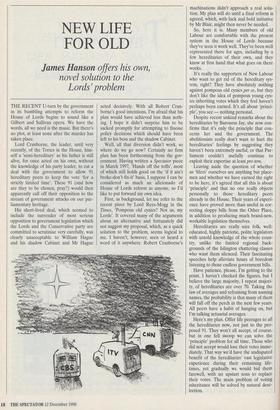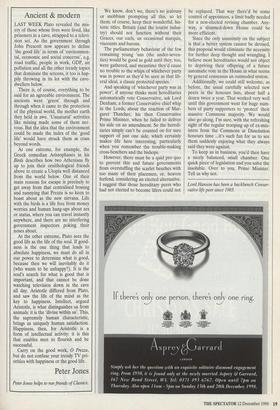NEW LIFE FOR OLD
THE RECENT U-turn by the government in its bumbling attempts to reform the House of Lords begins to sound like a Gilbert and Sullivan opera. We have the words, all we need is the music. But there's no plot, at least none after the murder has taken place.
Lord Cranborne, the leader, until very recently, of the Tories in the House, him- self a 'semi-hereditary' as his father is still alive, for once acted on his own, without the knowledge of his party leader, to cut a deal with the government to allow 91 hereditary peers to keep the vote 'for a strictly limited time'. These 91 (and how are they to be chosen, pray?) would then apparently call off their opposition to the stream of government attacks on our par- liamentary heritage.
His short-lived deal, which seemed to include the surrender of most serious opposition to government legislation which the Lords and the Conservative party are committed to scrutinise very carefully, was clearly unacceptable to William Hague and his shadow Cabinet and Mr Hague acted decisively. With all Robert Cran- borne's good intentions, I'm afraid that his plan would have achieved less than noth- ing. I hope it didn't surprise him to be sacked promptly for attempting to finesse policy decisions which should have been left to his boss and the shadow Cabinet.
Well, all that diversion didn't work, so where do we go now? Certainly no firm plan has been forthcoming from the gov- ernment. Having written a Spectator piece in March 1997, 'Hands off the toffs', most of which still holds good on the 'if it ain't broke-don't-fix-it' basis, I suppose I can be considered as much an aficionado of House of Lords reform as anyone, so I'd like to put forward my own idea.
First, as background, let me refer to the recent piece by Lord Rees-Mogg in the Times, 'Pompous old cynics? Not us, my Lords'. It covered many of the arguments about an alternative and fortunately did not suggest my proposal, which, as a quick solution to the problem, seems logical to me. I haven't, however, seen or heard a word of it anywhere. Robert Cranborne's machinations didn't approach a real solu- tion. My plan will do until a final reform is agreed, which, with luck and bold initiative by Mr Blair, might then never be needed.
So, here it is. Many members of old Labour are comfortable with the present system in the House of Lords because they've seen it work well. They've been well represented there for ages, including by a few hereditaries of their own, and they know at first hand that what goes on there works.
It's really the supporters of New Labour who want to get rid of the hereditary sys- tem, right? They have absolutely nothing against pompous old cynics per se, but they don't like the idea of pompous young cyn- ics inheriting votes which they feel haven't perhaps been earned. It's all about 'princi- ple', you see — nothing personal.
Despite recent unkind remarks about the hereditaries by Baroness Jay, she now con- firms that it's only the principle that con- cerns her and the government. The abolitionists really don't want to hurt the hereditaries' feelings by suggesting they haven't been extremely useful, or that Par- liament couldn't usefully continue to exploit their expertise at least pro tem.
Leaving aside the question of whether us 'lifers' ourselves are anything but place- men and whether we have earned the right to be here, it's agreed that all this is about `principle' and that no one really objects personally to those hereditary peers already in the House. Their years of experi- ence have proved more than useful in cor- recting sloppy bills from the Other Place, in addition to producing much brand-new, workable legislation themselves.
Hereditaries are really nice folk, well- educated, highly patriotic, polite legislators with untold knowledge of the whole coun- try, unlike the limited regional back- grounds of the Islington chattering classes who want them silenced. Their fascinating speeches help alleviate hours of boredom listening to those endless government bills.
Have patience, please, I'm getting to the point. I haven't checked the figures, but I believe the large majority, I repeat majori- ty, of hereditaries are over 70. Taking the law of averages and refraining from naming names, the probability is that many of them will fall off the perch in the next few years. All peers have a habit of hanging on, but I'm talking actuarial averages.
Here's my plan. Offer life peerages to all the hereditaries now, not just to the pro- posed 91. They won't all accept, of course, but in one fell swoop we can solve the `principle' problem for all time. Those who did not accept would lose their votes imme- diately. That way we'd have the undisputed benefit of the hereditaries' vast legislative experience during their remaining life- times, yet gradually we would bid them farewell, with no upstart sons to replace their votes. The main problem of voting inheritance will be solved by natural dese- lection. We know, don't we, there's no jealousy or snobbism prompting all this, so let them, of course, keep their wonderful, his- toric titles. Britain (and the tourist indus- try) should not function without their Graces, our earls, an occasional marquis, viscounts and barons.
The parliamentary behaviour of the few remaining young 'uns (the under-seven- ties) would be good as gold until they, too, were gathered, and meantime they'd cause no trouble to the whips of whichever party was in power as they'd be seen as that lib- eral ideal, a classic protected species.
And speaking of 'whichever party was in power', if anyone thinks most hereditaries automatically vote Conservative, ask Lord Denham, a former Conservative chief whip in the Lords, about the reaction of Mar- garet Thatcher, his then Conservative Prime Minister, when he failed to deliver his side on an amendment. So the heredi- taries simply can't be counted on for sure support of just one side, which certainly makes life here interesting, particularly when you remember the trouble-making cross-benchers and the bishops.
However, there must be a quid pro quo to prevent this and future governments from overstuffing the scarlet benches with too many of their placemen, or, heaven forfend, considering an elected alternative. I suggest that those hereditary peers who had not elected to become lifers could not be replaced. That way there'd be some control of appointees, a limit badly needed for a non-elected revising chamber. Any- way, a slimmed-down House could be more efficient.
Since the only unanimity on the subject is that a better system cannot be devised, this proposal would eliminate the necessity for further deep thought and wrangling. I believe most hereditaries would not object to depriving their offspring of a future automatic vote in the House in what seems by general consensus an outmoded system.
Additionally, we could still welcome, as before, the usual carefully selected new peers in the honours lists, about half a dozen twice a year. That worked very well until this government went for huge num- bers of party supporters to `protect' their massive Commons majority. We would also go along, I'm sure, with the refreshing sight of the regular trooping up of ex-min- isters from the Commons at Dissolution honours time ...it's such fun for us to see them suddenly enjoying what they always said they were against.
To keep us in business, you'd then have a nicely balanced, small chamber. One quick piece of legislation and you solve the insoluble. Over to you, Prime Minister. Tell us why not.
Lord Hanson has been a backbench Conser- vative life peer since 1983.











































































 Previous page
Previous page